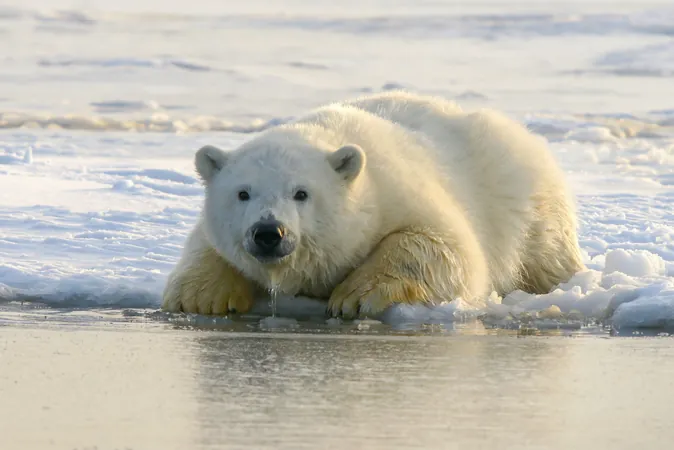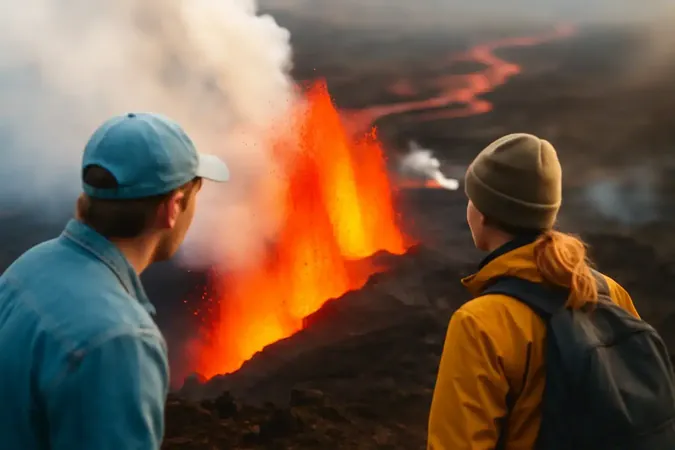
Arctic Warming: A New Era for Ocean Ecosystems?
2025-09-16
Author: Ming
The Arctic is heating up at an alarming rate, faster than nearly anywhere on Earth, and researchers are now revealing the unprecedented impacts this has on our oceans.
Recent groundbreaking research from the Plymouth Marine Laboratory (PML) has uncovered dramatic changes in how carbon and nutrients flow between the ocean floor and the surface waters due to this warming. This process, known as benthic-pelagic exchange, is crucial for the health of marine life and the ocean's ability to cycle carbon effectively.
Significantly, both the Polar Front—the dividing line between cold polar air and warmer Atlantic air—and seasonal ice boundaries have moved roughly 93 miles northward since 1960. The Barents Sea, in particular, is being referred to as 'Atlantified' due to its role as a hot spot for Arctic warming, with seasonal sea ice loss progressing more rapidly than anywhere else in the Arctic. Some models predict this region could be entirely ice-free year-round by 2080!
As the ice melts, the interaction between the seafloor and open waters is expected to undergo major transformations. Traditionally, organisms on the seafloor rely on organic matter drifting down from above, but with diminishing ice cover, researchers warn that the quantity and quality of this food source could change—potentially jeopardizing benthic ecosystems.
Moreover, newly exposed areas that used to be ice-protected might face increased human activity, such as trawling, heightening the risks for marine life.
The study, titled ‘Will the declining sea ice extent in the Arctic cause a reversal of net benthic-pelagic exchange directions?’ suggests that these shifts could disrupt the crucial movement of matter between the seabed and water column—a key process for carbon and nutrient cycling. This exchange is influenced by factors like physical mixing and animal activities, and can function in two directions: downward movement of particles and upward mixing of dissolved materials.
This intriguing research is part of the Changing Arctic Ocean Seafloor project (ChAOS), focused specifically on the Barents Sea, a shallow shelf in the Arctic Ocean. Led by Dr. Saskia Rühl from Plymouth Marine Lab, the project involves in-situ sampling and experiments designed to understand how various conditions affect matter movement between the ocean floor and water.
Findings reveal that in the southern Barents Sea—characterized by more Atlantic influences—dissolved substances predominantly move down to the seabed while particles ascend into the water. Contrarily, the northern Barents Sea, influenced by Arctic conditions, functions as a 'depositional zone,' where materials settle and enhance productivity at the sediment surface.
The implications of these findings are staggering. As the Polar Front shifts further north, the northern regions may start to mirror southern conditions, resulting in areas where sediments are less reliably deposited and increased disruption to the seafloor ecosystem.
Dr. Rühl emphasizes, 'Our findings underline the need for comprehensive monitoring of the Arctic's evolving ecosystems. It is essential to understand how particulate and dissolved fluxes respond to both climate and human pressures to predict impacts on biodiversity, fisheries, and the Arctic's role in carbon storage.'
This research sets a crucial foundation for future studies and refining ecosystem models in one of the world’s most climate-sensitive seas.


 Brasil (PT)
Brasil (PT)
 Canada (EN)
Canada (EN)
 Chile (ES)
Chile (ES)
 Česko (CS)
Česko (CS)
 대한민국 (KO)
대한민국 (KO)
 España (ES)
España (ES)
 France (FR)
France (FR)
 Hong Kong (EN)
Hong Kong (EN)
 Italia (IT)
Italia (IT)
 日本 (JA)
日本 (JA)
 Magyarország (HU)
Magyarország (HU)
 Norge (NO)
Norge (NO)
 Polska (PL)
Polska (PL)
 Schweiz (DE)
Schweiz (DE)
 Singapore (EN)
Singapore (EN)
 Sverige (SV)
Sverige (SV)
 Suomi (FI)
Suomi (FI)
 Türkiye (TR)
Türkiye (TR)
 الإمارات العربية المتحدة (AR)
الإمارات العربية المتحدة (AR)